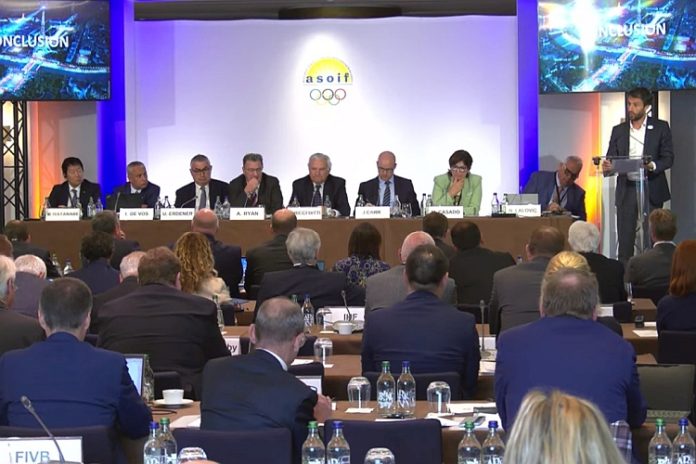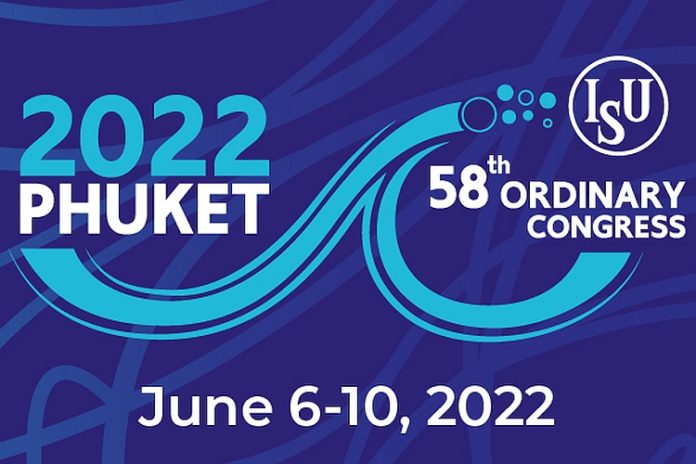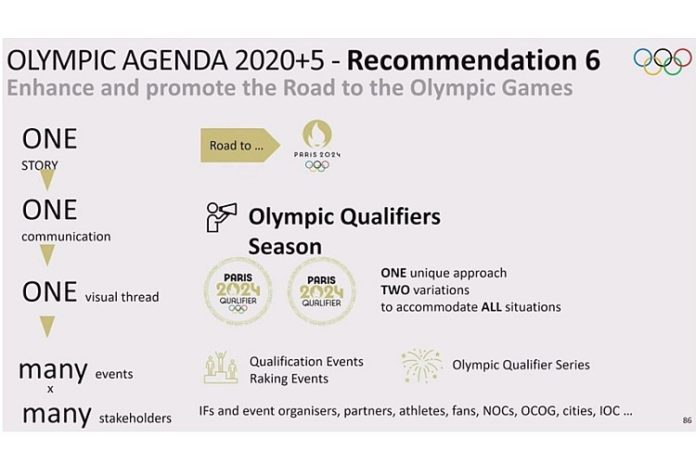(★ Friends: Your support keeps this site going. Please donate here if you would like to assist; thanks in advance for your generosity ★)
At the end of a detailed – and well-received – presentation before the Association of Summer Olympic International Federations, the President of the Paris 2024 organizing committee, three-time Olympic canoeing gold medalist Tony Estanguet (FRA) told senior executives of 27 federations which they did not want to hear:
“Paris 2024 is progressing well, and along with the team are fully committed to deliver fantastic Games in 2024. In conclusion, I would like to say a few words about the main challenge that we will be tackling in the second half of ‘22: the budget.
“As [ASOIF President] Francesco [Ricci Bitti (ITA)] mentioned, the health, economy, the geopolitical crises that have occurred over the last two years pose new challenges for Paris 2024. And without going into too many details, the Covid crisis and the terrible conflict in Ukraine have caused major breakdowns in production, and supply chains. They have also generated an inflationary environment that was impossible to anticipate a few months ago.
“As a result, even though we have already secured most of our revenues, this challenging context puts the Paris 2024 overall budget at risk, since most of our expenses have not been incurred yet. This is why we have two main objectives for the months to come. The first one is to continue – thanks to your support – to push optimization and savings even further, behind the scenes, avoiding any risk for the Games delivery.
“And the second objective is to maintain the level of ambition, to best showcase your sport’s athlete performance and send to the world the best possible image of the Olympic Movement. We don’t want to choose between responsibility and ambition. This is why our project remains attractive for the stakeholders and the general public, with 82% of public support, according to the last survey.
“And we will need your help to successfully address this challenge. Together, we can work on some sensible optimizations on many aspects of the Games delivery, because you are the ones who know best what can be done in your respective sports. If we share the same goal and work in close collaboration, I am convinced we will be able to find solutions together.”
The organizing committee’s budget is currently set at €3.98 billion (~$4.28 billion U.S.), comprised primarily of funds from the International Olympic Committee, domestic sponsorships and other marketing programs, and ticket sales.
The budget difficulties, an echo of past strains at Rio 2016 and with the postponement of the Tokyo 2020 Games to 2021, were underscored by ASOIF Executive Director Andrew Ryan (GBR):
“I think we have to accept we are in an era, as we were with Rio and Tokyo, where [the ASOIF] Council strongly believes … there will be a great deal of emphasis of the optimization of how we deliver these Games, in an efficient way, to the highest service level possible.
“What that means, in blunt speech, is there will be very tight financial constraints. But against that, we also have to then make everyone aware – all of us, the organizing committee, the IOC – that delivering these Games therefore will be about a cooperation. That means total transparency, total openness, full consultation and as we go very close now into the two-year period for the Paris Games, that’s something which is going to become very important.
“Because it’s also certain that Paris will rely – we know this from much of the feedback we get from you – on the cooperation of the International Federations to find savings, cost savings, and so on which will make the Games possible, for Paris to deliver their dream, even within, Tony, the constraints of the financial conditions we face due to a number of things. We know the Covid pandemic era, also now against the background of inflation and economic impacts, at least in part but often fully associated with the war in Ukraine.”
That sounds easy enough, but then there was this exchange between FIBA Secretary General Andreas Zagklis (GRE) and Estanguet over the highly contentious question of venues for the group-stage games in basketball, as well as the 3×3 tournaments:
“We fully respect that the Olympic Games may not [any] longer be able to offer conditions equal to some of the world championships – in our case, the basketball World Cup – but I think everyone is ready to accept this because this is about the experience of the Olympics. It’s about the Opening Ceremony, it’s about the Olympic Village, it’s about the feeling of belonging to the no. 1 sporting event on the planet, and in this case, in one of the most beautiful cities in the world. …
“[But] we don’t feel that our athletes should be subject to the conditions that we currently have on the table. I’m talking about being able to accommodated in Paris, in the Village, to have transportation up to one hour, not three hours to the venues, and a venue which complies with technical requirements. For example, guarantees on the safety of play during the hottest days of the summer, and conditions that we can take care of the recovery and the meals of the athletes.
“We’re happy to fill up the big venues, to help the organizing committee generate ticketing revenue, but we feel some basic conditions for our players, like in all previous Olympics, should be respected since the athlete experience is at the heart of the Games.”
Estanguet replied, quite diplomatically, in pertinent part:
“I agree with you that it’s thanks to your support since the beginning that this project is still right on track, because we all know in this room that we haven’t been in an easy situation with all the different crises, and the level of ambition is very high, the level of expectation is very high.
“Everyone would like to play in the center of Paris, in the best arena, in the best location, at the foot of the Eiffel Tower, and since the beginning globally, you all assist and support [the] Paris 2024 vision to be spectacular, ambitious, but also popular, and putting the sport out of stadiums also when it’s feasible to marry the best of France, the iconic landmarks, with the sport emotions was key for us. It was a promise and we are still on track to deliver it. …
“We have to adapt, we have to optimize, we have to find solutions to maintain the level of ambition as much as we can with our budgetary limits, and that’s why we are together studying, optimizing and finding the best optimization, compromise. I know it’s not easy for you and I really appreciate the effort you made already, in the past – in the recent past and recent years – to stand where we stand today. We will still have challenges and probably beyond basketball. We don’t know exactly what will happen in the coming two years, but we have to be ready to adapt, to be flexible, to find collective solutions acceptable – and when I say acceptable, it’s acceptable for you first – but it’s also acceptable for all our stakeholders.”
And then – ominously – Estanguet added:
“The public opinion is so far very in support of the Games. But we also know that it could be some kind of fragility where we will continue this very difficult context to increase the budget, so that’s why we need to find solutions. You can count on our side to really try to give the best to basketball, to the athlete’s family in basket, and trying to find a solution to, again, optimize the athlete experience.
“It won’t be easy and for us, it’s really difficult on a daily basis – you all know that – but we are here to try to maintain a kind of balance, also, among the sports and offer to the French audience very good capacity for basketball, for instance, and that’s also a balance we’re trying to look to at at the moment.”
Observed: Every organizing committee, no matter how well intended, talented or managed, goes through this situation. Russia’s war against Ukraine has serious economic implications for Europe and inflation fears are only stoking concern.
However, for future organizers, Zagklis’ assertion that the Olympic Games may not be at the standard of some of the more gaudy world championships – like FIBA’s World Cup – is a welcome admission of reality that can be taken to the bank. It’s worth wondering how many of his fellow federation executives agree with his comment.
¶
The Paris 2024 discussion was only part of a day-long meeting of the ASOIF General Assembly, mostly in-person in Lausanne (SUI), but also with some guests online. On the agenda was a discussion of the distribution of the $540 million provided by the IOC from its Tokyo 2020 television rights sales, which is distributed by ASOIF.
The federations agreed in 2013, and have since maintained, a distribution formula with five groups, with Aquatics, Athletics and Gymnastics at the top, then Basketball, Cycling, Football, Tennis and Volleyball in the second tier and then eight sports in the third tier, nine in the fourth and three in the fifth (28 total).
There was a request from some of the sports in tiers 3-4-5 to equalize the payments, since they were fairly close anyway – with $1-2 million each – but the IOC was not amenable to a raising the payout. And as Ricci Bitti noted, “It’s not our money, it’s the IOC’s money.”
The role of the federations in governance was also discussed at length, including what will happen to the Global Association of International Sports Federations (GAISF), which pre-dates the ASOIF, but is now on the verge of dissolution, to be voted on in September.
Essentially, the roles that GAISF played over the years have been taken up by other organizations, making it irrelevant. However, the long-time role of GAISF in vetting and recognizing new international federations continues to be important with the explosion of new sports, and a new structure is needed.
Ricci Bitti stated that, in the end, this is all about trying to get onto the Olympic program and so a new committee that includes the IOC as well as the associations of (1) summer Olympic federations, (2) winter Olympic federations, (3) recognized federations and (4) non-recognized federations is suggested. This would include strict regulations on admission and veto powers for existing federations which could be challenged by new organizations.
There is a lot going on in the Olympic Movement behind the scenes, but the question of Paris and money has taken center stage with 778 days to go.
Rich Perelman
Editor
You can receive our exclusive TSX Report by e-mail by clicking here. You can also refer a friend by clicking here, and can donate here to keep this site going.
For our updated, 620-event International Sports Calendar for 2022 and beyond, by date and by sport, click here!






















